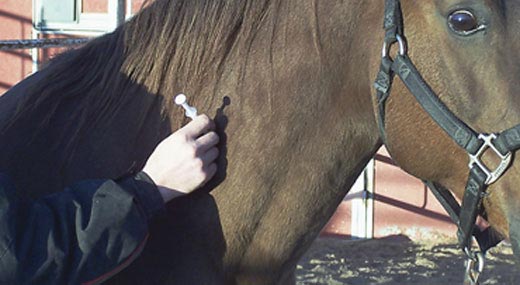 Horses are pretty tough animals. They can ride for hours on end, clop along some rough terrain, and withstand some pretty brutal elements. However, they aren’t immune to everything the world can throw at them, and one disease they need to be careful of is tetanus. Humans know this pretty well as we usually have to get tetanus shots whenever we puncture ourselves on a nail or something, but horses aren’t going to be careful to tell you something like that. So then, here’s what you need to be aware of regarding tetanus and your horse.
Horses are pretty tough animals. They can ride for hours on end, clop along some rough terrain, and withstand some pretty brutal elements. However, they aren’t immune to everything the world can throw at them, and one disease they need to be careful of is tetanus. Humans know this pretty well as we usually have to get tetanus shots whenever we puncture ourselves on a nail or something, but horses aren’t going to be careful to tell you something like that. So then, here’s what you need to be aware of regarding tetanus and your horse.
Tetanus is a type of illness that can occur by a wound being infected very easily, either via a scratch or a full puncture. Basically, any injury sustained while going about their business that doesn’t get cleaned up could potentially turn into tetanus, and if that happens you would be looking at either a horse that needs to be put down, or a horse that goes down on its own. Neither end result is what we want to see, so be sure to take extra precautions to avoid it at all cost.
It’s a good habit to check your horse’s feet every day to see if they’ve punctured the soles or not, or have a nasty cut or anything similar. If you find a wound, clean it right away and get some anti-bacterial ointment on there! The tetanus bacteria can survive on an unclean surface for quite some time, plus it doesn’t need oxygen. Usually it inhabits soil and animal droppings, just waiting for an open wound to come along that it can climb into. At any given moment you could be risking a nasty infection to your horse if you aren’t keeping them and their environment clean, or at the very least cleaner than not.
What tetanus does is travel to the spinal cord and the central nervous system of your horse, then starts to seriously mess up your horse’s ability to move about or even control their muscles. Typically you’ll see severe muscle contractions and spasms, usually within 24 hours of contracting the bacteria. You can also see many horses hit hard by tetanus lying on their side with their legs sticking straight out and their necks stretched in an uncomfortable way, as well as their eyelids twitching and a general difficulty in opening their jaw (lockjaw).
The end result, as mentioned, is usually death. This comes as a result of the respiratory system completely shutting down, and it can’t really be helped. It’s not something you want to see, and not a ton of prevention can be done beyond checking your horse regularly for wounds and mucking their stalls every day. Cleanliness is the key here, so keep your horse and its world clean and you may indeed be looking at a happy, healthy horse for a long time to come.
Related Articles
Breaking a Leg- What It Means For Your Horse
Deadly Equine Diseases
Tips for Keeping Flies Under Control
Horse Inspection Checklist
Five Most Common Horse Diseases
How to Spot a Malnourished Horse
Top 10 Most Poisonous Plants for Horses
Feeding and Rebuilding a Malnourished Horse
Helping a Horse Living with Cushing's
How to Treat Abscesses on Your Horse
Colic and Your Horse
Confirming That Your Horse Has Rabies
Helping a Pregnant Mare
Handling a Rattlesnake Bite to Your Horse
Being Aware of Tetanus and Your Horse
Preventing Thrush in Your Horse